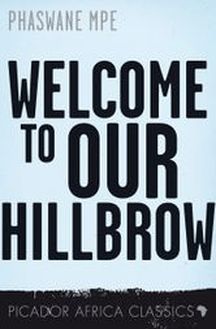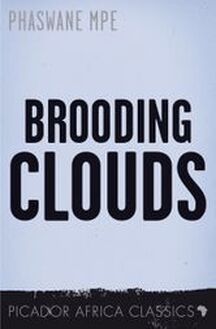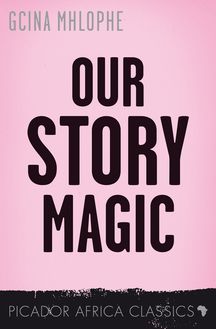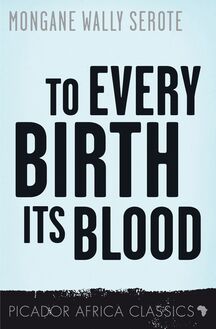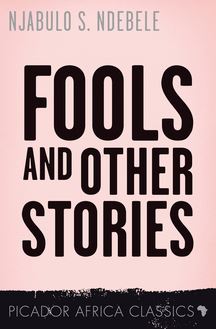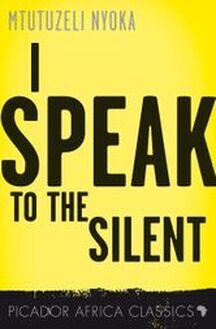-
 Univers
Univers
-
 Ebooks
Ebooks
-
 Livres audio
Livres audio
-
 Presse
Presse
-
 Podcasts
Podcasts
-
 BD
BD
-
 Documents
Documents
-
- Cours
- Révisions
- Ressources pédagogiques
- Sciences de l’éducation
- Manuels scolaires
- Langues
- Travaux de classe
- Annales de BEP
- Etudes supérieures
- Maternelle et primaire
- Fiches de lecture
- Orientation scolaire
- Méthodologie
- Corrigés de devoir
- Annales d’examens et concours
- Annales du bac
- Annales du brevet
- Rapports de stage
La lecture à portée de main
Vous pourrez modifier la taille du texte de cet ouvrage
Découvre YouScribe en t'inscrivant gratuitement
Je m'inscrisDécouvre YouScribe en t'inscrivant gratuitement
Je m'inscrisEn savoir plus
Vous pourrez modifier la taille du texte de cet ouvrage
En savoir plus

Description
Fools and Other Stories is an intricate and subtle collection that deals with the formative experiences of growing up in a Johannesburg township during the apartheid years.
‘These five stories are part of a long project in which I am attempting to explore imaginatively various aspects of life in the community I grew up in in South Africa. The first part, which these five stories cover, deals with the themes of early childhood and adolescence. In the second part I hope to explore adult life up to old age; lastly, I want to imaginatively study the movement of social change.’ – Njabulo S. Ndebele
Sujets
Informations
| Publié par | Pan Macmillan South Africa |
| Date de parution | 01 avril 2015 |
| Nombre de lectures | 1 |
| EAN13 | 9781770104204 |
| Langue | English |
Informations légales : prix de location à la page 0,0391€. Cette information est donnée uniquement à titre indicatif conformément à la législation en vigueur.
Extrait
About Picador Africa Classics
The Picador Africa Classics imprint, launched in 2014 by Pan Macmillan South Africa, aims to build a catalogue of exceptional titles that may be out of print or lack presence in digital form. It builds on the historical concept of something like the African Writers Series as well as a publisher such as Ravan Press, which showcased works of excellence by African writers.
As a leading South African publisher, Pan Macmillan’s initial focus is on classics of South African literature, both fiction and non-fiction, but we hope to expand this to writers from other countries on the African continent.
NJABULO SIMAKAHLE NDEBELE grew up in the Western Township, Johannesburg, and later in Charterston Location, Nigel, which provides the setting for his stories. In 1984 Ndebele s Fools and Other Stories won the Noma Award, a prestigious African literary award, for the best book published in Africa. Ndebele s highly influential essays on South African literature and culture were published in a collection entitled Rediscovery of the Ordinary in 1991, and his novel The Cry of Winnie Mandela was published to critical acclaim in 2003, and reissued in 2013. Ndebele holds an MA from the University of Cambridge and a PhD from the University of Denver.
Fools
Other Stories
Fools
Other Stories
Njabulo S. Ndebele
PICADOR AFRICA
First published in 1983 by Ravan Press
This ebook edition published in 2015 by Picador Africa Classics
an imprint of Pan Macmillan South Africa
Private Bag X19, Northlands Johannesburg, 2116
www.panmacmillan.co.za
e-ISBN 978-1-77010-420-4
in the text Njabulo S. Ndebele 1983
in the editorial matter and final arrangement Pan Macmillan South Africa (Pty) Ltd 2015
All rights reserved. No part of this publication may be reproduced, stored in or introduced into a retrieval system, or transmitted in any form or by any means (electronic, mechanical, photocopying, recording or otherwise), without the prior written permission of the publisher. Any person who does any unauthorised act in relation to this publication may be liable to criminal prosecution and civil claims for damages.
This book is a work of fiction. Any resemblance to actual persons, living or dead, is purely coincidental.
Cover design of this edition by K4
In remembrance of my mother, Makhosazana, and my father, Nimrod.
Table of Contents
The Test
The Prophetess
Uncle
The Music of the Violin
Fools
The Test
As he felt the first drops of rain on his bare arms, Thoba wondered if he should run home quickly before there was a downpour. He shivered briefly, and his teeth chattered for a moment as a cold breeze blew and then stopped. How cold it had become, he thought. He watched the other boys who seemed completely absorbed in the game. They felt no rain, and no cold. He watched. The boys of Mayaba Street had divided themselves into two soccer teams. That was how they spent most days of their school vacations: playing soccer in the street. No, decided Thoba, he would play on. Besides, his team was winning. He looked up at the sky and sniffed, remembering that some grown-ups would say one can tell if it is going to rain by sniffing at the sky the way dogs do. He was not sure if he could smell anything other than the dust raised by the soccer players around him. He could tell, though, that the sky, having been overcast for some time, had grown darker.
Should I? he thought. Should I go home? But the ball decided for him when it came his way accidentally, and he was suddenly swept into the action as he dribbled his way past one fellow. But the next fellow took the ball away from him, and Thoba gave it up without a struggle. It had been a quick thrill. He had felt no rain, no cold. The trick is to keep playing and be involved, he thought. But he stopped, and looked at the swarm of boys chasing after the tennis ball in a swift chaotic movement away from him, like a whirlwind. They were all oblivious of the early warnings of rain. He did not follow them, feeling no inclination to do so. He felt uncertain whether he was tired or whether it was the fear of rain and cold that had taken his interest away from the game. He looked down at his arms. There they were: tiny drops of rain, some sitting on goose pimples, others between them. Fly s spit, he thought.
Soon there was a loud yell. Some boys were jumping into the air, others shaking their fists, others dancing in all sorts of ways. Some, with a determined look on their faces, trotted back to the centre, their small thumbs raised, to wait for the ball to be thrown in again. Someone had scored for Thoba s team. The scorer was raised into the air. It was Vusi. But Vusi s triumph was short-lived for it was just at that moment that the full might of the rain came. Vusi disappeared from the sky like a mole reversing into its hole. The boys of Mayaba Street scattered home, abandoning their match. The goal posts on either side disappeared when the owners of the shoes repossessed them. Thoba began to run home, hesitated, and changed direction to follow a little group of boys towards the shelter of the walled veranda of Simangele s home.
Thoba found only Simangele, Vusi, Mpiyakhe, and Nana on the veranda. He was disappointed. In the rush, it had seemed as if more boys had gone there. Perhaps he really should have run home, he thought. Too late, though. He was there now, at the veranda of Simangele s home, breathing hard like the others from the short impulsive sprint away from the rain. They were all trying to get the rain water off them: kicking it off their legs, or pushing it down their arms with their fingers, the way windscreen wipers do. Simangele wiped so hard that it looked as if he was rubbing the water into his skin. Only Vusi, who had scored the last goal, was not wiping off the water on him. There was an angry scowl on his face as he slowly massaged his buttocks, all the while cursing:
The bastards, he said. The bastards! They just dropped me. They let go of me like a bag of potatoes. I ll get them for that. One by one. I ll get them one by one.
What if you are a bag of potatoes? said Simangele laughing. What do you think, fellows? He was jumping up and down like a grown-up soccer player warming up just before the beginning of a game. He shadow-boxed briefly then jumped up and down again.
Simangele got no response from the others. It would have been risky for them to take sides. Thoba rubbed his arms vigorously, making it too obvious that he was shamming a preoccupation with keeping warm in order to avoid answering Simangele s question. But Vusi did not fear Simangele.
This is no laughing matter, he said.
Then don t make me laugh, replied Simangele, shadow-boxing with slow easy sweeps of his arms.
Vusi uttered a click of annoyance and looked away from Simangele. He continued to massage his buttocks.
Simangele looked at Vusi for a while, and then turned away to look at Nana.
Are you warm? he asked, suddenly looking gentle.
Nana, who was noticeably shivering, sniffed back mucus and nodded.
Perhaps you should sit there at the corner, said Simangele.
Thoba looked at Nana and felt vaguely jealous that Nana should receive such special attention from Simangele. But then Nana always received special attention. This thought made Thoba yearn for the security of his home. He began to feel anxious and guilty that he had not run home. Not only did he feel he did not matter to Simangele and Vusi, he also feared the possibility of a fight between these two. Quarrels made him uneasy. Always. What would his mother say if he was injured in a fight? Rather, wouldn t she be pleased to hear that he had run home as soon as the rain started? The rain. Yes, the rain. He looked at it, and it seemed ominous with its steady strength, as if it would go on raining forever, making it impossible for him to get home before his mother. And how cold it was now! Should he? Should he run home? No. There was too much rain out there. Somewhat anxiously, he looked at the others, and tried to control his shivering.
The other three boys were looking at Nana huddling himself at the corner where the house and the veranda walls met. He looked frailer than ever, as if there were a disease eating at him all the time. Thoba wished he had a coat to put over Nana. But Nana seemed warm, for he had embraced his legs and buried his head between his raised knees. The only sound that came from him was a continuous sniff as he drew back watery mucus, occasionally swallowing it. Thoba wondered if Nana s grandmother was home. Or did the rain catch her far in the open fields away from the township, where it was said she dug all over for roots and herbs? She was always away looking for roots to heal people with. And when she was away, Nana was cared for by everyone in Mayaba Street. Thoba looked at Nana and wished that he himself was as lucky.
Just then, Mpiyakhe turned round like a dog wanting to sit, and sat down about a foot from Nana. He began to put his shoes on. Mpiyakhe s shoes had been one of the two pairs that had been used as goal posts. Thoba looked at Mpiyakhe s feet as Mpiyakhe slipped them into socks first, and noticed how smooth those feet were compared to Nana s which were deeply cracked. Then he looked at Vusi s and Simangele s feet. Theirs too were cracked. His were not. They were as smooth as Mpiyakhe s. Thoba remembered that he had three pairs of shoes, and his mother had always told him to count his blessings because most boys had only one pair, if any shoes at all, for both school and special occasions like going to church. Yet Thoba yearned to have cracked feet too. So whenever his mother and father were away from home, he would go out and play without his shoes. But Mpiyakhe never failed to wear his shoes. Perhaps that was why Mpiyakhe s shoes were always being used as goal posts. They were always available.
Soon, Thoba, Mpiyakhe, Vusi, and Si
-
 Univers
Univers
-
 Ebooks
Ebooks
-
 Livres audio
Livres audio
-
 Presse
Presse
-
 Podcasts
Podcasts
-
 BD
BD
-
 Documents
Documents
-
Jeunesse
-
Littérature
-
Ressources professionnelles
-
Santé et bien-être
-
Savoirs
-
Education
-
Loisirs et hobbies
-
Art, musique et cinéma
-
Actualité et débat de société
-
Jeunesse
-
Littérature
-
Ressources professionnelles
-
Santé et bien-être
-
Savoirs
-
Education
-
Loisirs et hobbies
-
Art, musique et cinéma
-
Actualité et débat de société
-
Actualités
-
Lifestyle
-
Presse jeunesse
-
Presse professionnelle
-
Pratique
-
Presse sportive
-
Presse internationale
-
Culture & Médias
-
Action et Aventures
-
Science-fiction et Fantasy
-
Société
-
Jeunesse
-
Littérature
-
Ressources professionnelles
-
Santé et bien-être
-
Savoirs
-
Education
-
Loisirs et hobbies
-
Art, musique et cinéma
-
Actualité et débat de société
- Cours
- Révisions
- Ressources pédagogiques
- Sciences de l’éducation
- Manuels scolaires
- Langues
- Travaux de classe
- Annales de BEP
- Etudes supérieures
- Maternelle et primaire
- Fiches de lecture
- Orientation scolaire
- Méthodologie
- Corrigés de devoir
- Annales d’examens et concours
- Annales du bac
- Annales du brevet
- Rapports de stage
